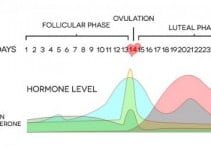C-sections are common surgical procedures performed during the delivery of a baby. C-sections, also known as cesarean sections, require a surgical incision in the mother’s abdomen and uterus to safely deliver the baby.
While c-sections are generally a safe procedure, they do come with more risks than a natural vaginal birth, and can come with complications as well.
C-sections are often either performed in a response to an emergency problem that arises in order to ensure the baby is born safely, or they can be scheduled in advance due to various reasons.
It’s common knowledge that after you give birth, your menstrual cycle will return again in the next few months. Having a c-section birth can affect the nature of your menstrual cycle when your period returns.
When will your period return?
Hormones play a significant part in the menstrual cycle, and so the return of your monthly period will be based off your hormone levels post-c-section delivery. After giving birth, the levels of hormones like estrogen, progesterone, and hCG (Human Chronic Gonadotropin) decrease.
Breastfeeding your baby can also affect your hormones, keeping the prolactin level high and therefore delaying ovulation for up to six months.
This isn’t necessarily accurate for every woman, so it is important to still be safe while having sex at this time.
If you do not breastfeed, your prolactin levels will likely decrease.
For women who choose not to breastfeed, the menstrual cycle will likely come back on average about six weeks after delivery, definitely after four weeks and up to twelve weeks. If your period hasn’t returned after three months, you should consult with your doctor to rule out any serious issues.
It might be different for every woman, as the return of your monthly period will be determined by how soon your hormones return to their pre-pregnancy state. Levels of HCG must be lowered, and estrogen and progesterone must balance out.
Women may also ovulate before they even see the return of their period, which is important to keep in mind when having sexual intercourse, as ovulation may occur while you are unaware.
What kind of period will it be?
C-section deliveries can often affect what kind of period you experience when it returns post-birth. Your period might differ in a number of ways, including in length of occurrence, menstrual blood color, and the amount of blood.
After you deliver a baby, you may experience bloody discharge for 4 to 6 weeks after delivery, which should not be confused with your period.
The first week after giving a c-section delivery, you will experience heavy bleeding, which is perfectly normal and will lessen.
You should not use tampons, as they can increase risk of infection post-surgery, so it is important to stick with sanitary pads only during this time. This discharge is called lochia, and gradually becomes lighter in color and lessens over time until it ceases.

When your period returns six or so weeks later, it will likely be different than the regular periods you had before. Your period can become irregular, although over time your cycle will balance out and become regular again.
It is common to also experience periods that occur with heavy cramping, or even periods associated with lighter bleeding and less cramping. It all depends on the hormonal changes going on in your body after delivering your baby, which can vary from woman to woman.
THINGS TO KNOW ABOUT C-SECTION AND PERIODS
Regular Periods
According to female reproductive health perspective, C-section will not affect your periods badly and most of the time menstrual cycle will resume quickly after C- section. The critical thing to consider about periods is the hormonal changes, not the C- section.
Once the hormonal level is balanced in females, your periods will start naturally. However, due to clinical complications or health conditions, the onset can be affected.
Irregular Periods
It is quite possible that the females might experience irregularity of periods after C-section. There is nothing to worry about irregular periods. It is a natural phenomenon and very common due to hormonal changes.
There are few things which might contribute to irregular periods after C-section that are weight gain, or weight loss, Stress, anxiety, and thyroid problem.
Lighter Periods
The blood flow may vary in females depending upon a few factors such as physical fitness as well as clinical condition. It is normal to experience lighter periods after C-section. Some female might find the periods less painful and shorter.
The menstrual cramps are milder due to the stretching of the uterus. Progesterone plays a critical role in relieving these symptoms.
Heavy Periods
Some females might have heavy periods after C-section. Some women might experience abnormal vaginal discharge many factors can contribute to heavy periods. Heavy blood flow can be unusual if the females have a medical history of vaginal infection.
It is normal to have heavy bleeding after C-section for the first few days. It this bleeding prolongs to 5 days then the gynecologist or physician should be consulted for medical examination.
How do c-sections affect your period?
Our monthly cycles are sensitive, and so any major stresses or changes put on the body can alter them. Since c-sections are a surgical delivery, our bodies need time to recover and heal afterwards, and the added stress and tiredness can affect the menstrual pattern.
Similarly, women recouping from the surgery will typically need to get plenty of rest, and so women who find themselves feeling over-exerted or having a difficult time getting back into physical activity may find that their periods are also affected as a result.
Other factors affecting menstruation post c-section delivery include the typical factors that result from pregnancy and birth, such as weight gain, weight loss, additional stress, and added complications and health issues. These issues can delay the period or cause irregularity.
It’s common to notice differences and irregularities in your period after undergoing a c-section delivery, but there are some signs that may indicate a more serious problem.
Heavy, increased bleeding that soaks your sanitary pad in a short amount of time may be a cause for concern. Similarly, ongoing bleeding that lasts for more than a month post-natal should indicate you need to visit your doctor.
Since c-sections are a surgery, it is important to keep an eye on your body during recovery. Incisions that swell, become red, or seep pus can indicate an infection, as well as odorous discharge from the vagina. If you experience any of these differences following your c section, it is important to see a doctor.
References:
-
1. Prior, E., Santhakumaran, S., Gale, C., Philipps, L. H., Modi, N., & Hyde, M. J. (2012). Breastfeeding after cesarean delivery: a systematic review and meta-analysis of world literature–. The American journal of clinical nutrition, 95(5), 1113-1135.
2. Moshtaghi, M., Zukerman, I., & Russell, R. A. (2015). Statistical models for unobtrusively detecting abnormal periods of inactivity in older adults. User Modeling and User-Adapted Interaction, 25(3), 231-265.
3. Miovech, S. M., Knapp, H., Borucki, L., Roncoli, M., Arnold, L., & Brooten, D. (1994). Major concerns of women after cesarean delivery. Journal of Obstetric, Gynecologic, & Neonatal Nursing, 23(1), 53-59.
4. Kinay, T., Basarir, Z. O., Tuncer, S. F., Akpinar, F., Kayikcioglu, F., Koc, S., & Karakaya, J. (2016). Is a history of cesarean section a risk factor for abnormal uterine bleeding in patients with uterine leiomyoma?. Saudi medical journal, 37(8), 871.
5. Jacobsen, B. K., Knutsen, S. F., Oda, K., & Fraser, G. E. (2012). Obesity at age 20 and the risk of miscarriages, irregular periods and reported problems of becoming pregnant: the Adventist Health Study-2. European journal of epidemiology, 27(12), 923-931.
6. Cao, G. S., Liu, R. Q., Liu, Y. Y., Liu, J. W., Li, L. P., Zhang, Q., … & Li, T. X. (2018). Menstruation recovery in scar pregnancy patients undergoing UAE and curettage and its influencing factors. Medicine, 97(11).




Got period for 3 days after 5 months and after c section, now no periods. I might be pregnant or not?
Hello Kate, usually after the pregnancy period cycles can vary so your missed period can be due to a lot of different reasons. And let me answer your question, pregnancy is also possible.
Hi
I am very concerned I had a C-section on the 8th of February 2019 and got injected the same day but I was breast feeding my baby is 1 year 10 months and still I have never seen my periods I have never taken any conceptive pills except for the injection I got at the hospital on the 8th should I see the doctor?
The contraceptive injections need informed consent before being injected if that’s what you’re concerned about and so does the uterus removal. They might have injected you with an Anti-D antibody injection to prevent Rh incompatibility in the next child.
The only possible explanation for period cessation is your breastfeeding. Breastfeeding acts as a natural contraceptive and can delay the period for up to a year if you regularly breastfeed your newborn.
My partner had an emergency C-Section October 2018. She has since had one period in the last 6 months should she go see a doctor or is this normal
Hello there Liam, her cycle has still no re-regularized. Give it some time. If not then she can see her doctor.
I had a c section on July 16th 2018 and my menses appeared on Oct 23rd 2018 and lasted for one week. I had a 28 days cycle before but this time no menses appeared this month and there is no chance of a pregnancy.. Is it normal to have skipped periods after a c section..??
Hi there Neenu,
Read the below link on menstruation of a C-Section.
https://womanjunction.com/menstrual-cycle-after-c-section/
Hi,
I had my baby via c-section March 2018. I did not breastfeed. I had a one day period with minor spotting 6 weeks post birth. On the same day, i started the contraceptive pill. Finished the contaceptive pill Aug 2018 and had a withdrawal bleed. No period since then exactly 2 months ago. Before baby, always had a long cycle (36-45 days) but never missed a period ever. Got pregnant first try. Should i be concerned or is my body re-regulating?
Hello ISLA. Will you be taking the contraceptive pill? You said you took it stopped and had a withdrawal bleed. Have you taken it since?